Last Updated: 07/05/2025
Switching from Puppy to Adult Dog Food
Want to know when how and why to switch your puppy to adult food? Read through our comprehensive Vet-written guide to find out all the answers.
Author: Dr Brittany Ward BVSc
Reading Time: 42 minutes - long read
It can be very confusing knowing when to switch your dog from a puppy food to an adult food, and many owners often base the decision on age alone.
Feeding a growing puppy the wrong diet could deprive them of essential nutrients and potentially lead to health issues, such as joint deformities like elbow dysplasia or Rickets disease. Likewise, continuing to feed a puppy food to an adult dog can lead to health problems like obesity.
By understanding your dog's growth stages and specific nutritional needs, you can ensure a seamless and healthy transition from puppy to adult dog food.
Contents:
Understanding Puppy Growth and Maturity
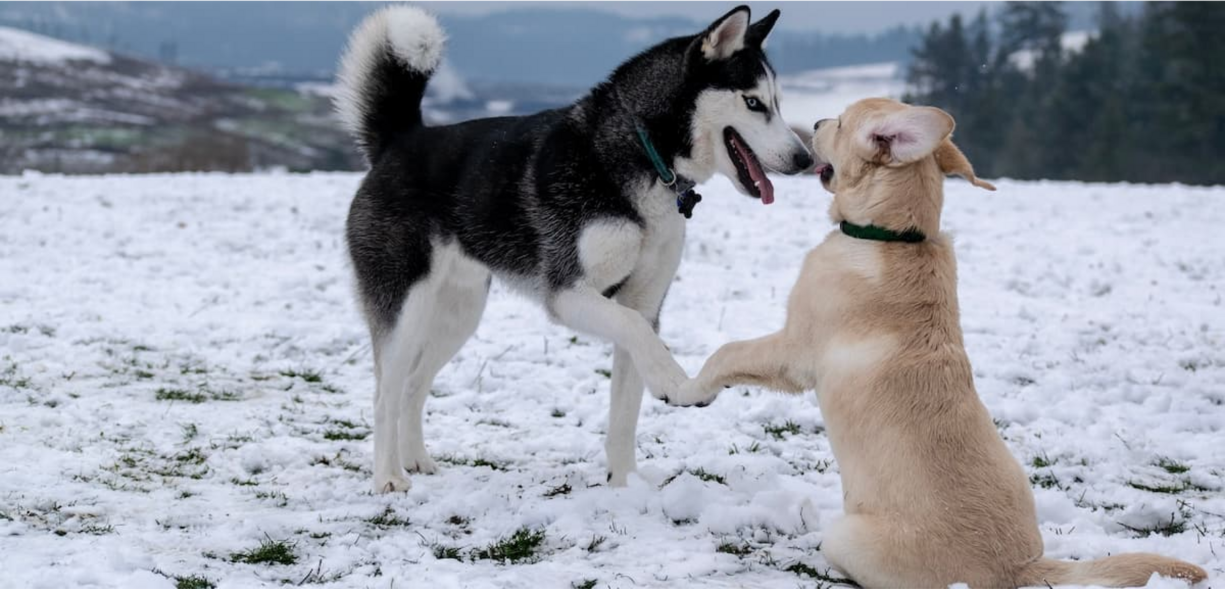
Using age as a starting point to decide when your dog has reached maturity is a great starting point, however, there is no one age that suits all puppies. There can be a variety of factors impacting a dog's maturity and when they have reached their adult size.
The age of maturity is generally determined by the closure of growth plates. Growth plates are soft, cartilaginous areas in the long bones (like those in the legs) that contain rapidly dividing cells. This rapid cell division is responsible for increasing the length of the bones. Similarly, the puppy's muscles and internal organs are growing to match this bone length increase, which is also a result of rapid cell division. Rapidly dividing cells require large amounts of protein as their building blocks and energy (typically sourced from fat) to continue to divide. Some puppies can put on 1 or more kilograms per week from this normal growth. This means that a puppy diet needs to meet these energy and protein demands so as to not delay healthy growth.
Growth can also occur too quickly, which often leads to joint developmental diseases, like Elbow Dysplasia. Diets can also contain too much protein and fat, which could lead to weight gain, which further hinders joint development. In order to prevent this excessive growth or weight gain, the ingredients in puppy diets should be regulated carefully. Nutritionally balanced and complete diets have tightly controlled calcium and phosphorus levels to control bone growth and an appropriate protein and fat content to prevent excess weight gain. Some premium diets may also include the amino acid L-carnitine to promote lean muscle mass growth.
As puppies get older, their adult teeth come in, they will shed their fluffy puppy coat to a coarser adult coat, their brain will be maturing and their immune system will be rapidly developing to support a healthy adult dog. A good puppy diet will take these factors into consideration and provide nutritional support for these key developmental areas. It's also the development of these areas, along with the nutrient requirements for growth, that make a puppy specific diet so important.
Based on this information, we can determine that a puppy will need to transition onto an adult diet once their growth stops, particularly when their growth plates close. So when is this? The age at which growth plates close depends on the individual dog and the only way to be certain would be to take a series of x-rays, which just isn't feasible. So instead, we make an estimation based on when the growth plates are most likely to close.
The time when growth will most likely stop and growth plates will close depends on the individual dog's breed, size, gender and health. This is because even within a breed group, there can be variations in size between dogs, especially in males compared to females. Some dogs may also have health conditions that prolong or shorten growth, or may have health conditions that require a diet change, such as a food allergy or sensitive stomach. Similarly, predicting the age of maturity in mixed breed dogs may not be as simple and their probable adult weight not as predictable.
When Will My Puppy Reach Maturity?
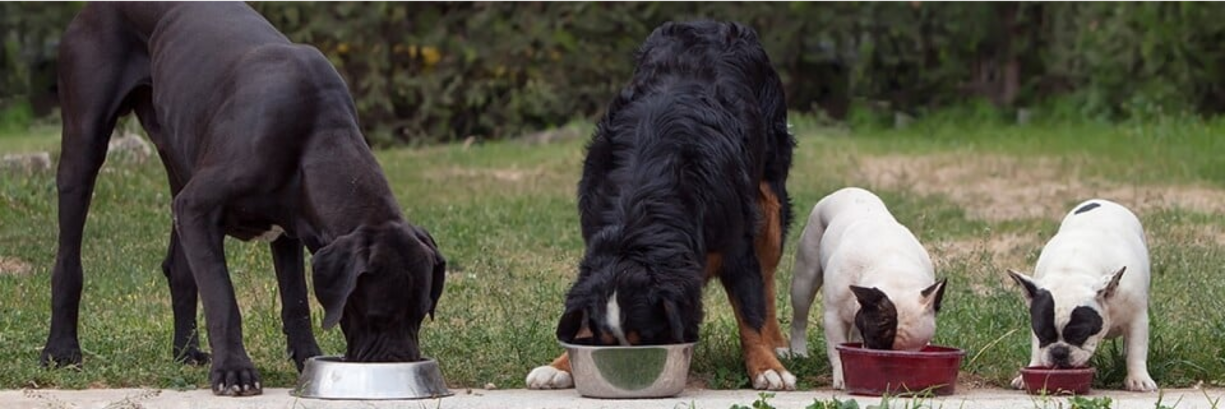
Small and Toy Breed Dogs
Small and Toy Breed Dogs will mature the fastest, reaching their adult size and weight the earliest. Small Breeds are those typically weighing less than 10kg at their adult weight, such as the Cavalier King Charles Spaniel, Dachshund and Shih Tzu.
It is recommended to transition Small Breed dogs to an adult food at around 9-12 months. Those with adult weights closer to 10kg, are best transitioned at 12 months of age, while Toy Breeds under 4kg may be able to transition on to adult food at 8-9 months of age.
If you have an intermediate breed, such as the French Bulldog, then it is best to wait until 12-13 months of age.
Medium Breed Dogs
A Medium Breed Dog is any dog weighing between 10-25kg, most commonly including breeds like the Border Collie, Cocker Spaniel and Beagle.
It is recommended to transition most medium breed dogs to an adult diet between 12-14 months of age, with larger medium breeds being left slightly later. Intermediate breeds, or those with an expected adult weight around 23-27kg like the American Staffy may remain on a puppy food until 15-16 months of age.
Large and Giant Breed Dogs
Large Breed dogs can be broken into two categories, Large breeds with an adult weight 25-40kg and Giant breeds, which is anything with an adult weight over 40kg.
Large breed puppies like the German Shepherds or Labradors are recommended to stay on a puppy food until 15-18 months of age. While Giant Breeds like the Great Dane or Irish Wolfhound should stay on a puppy food until 18-24 months of age.
Transitioning To Adult Food
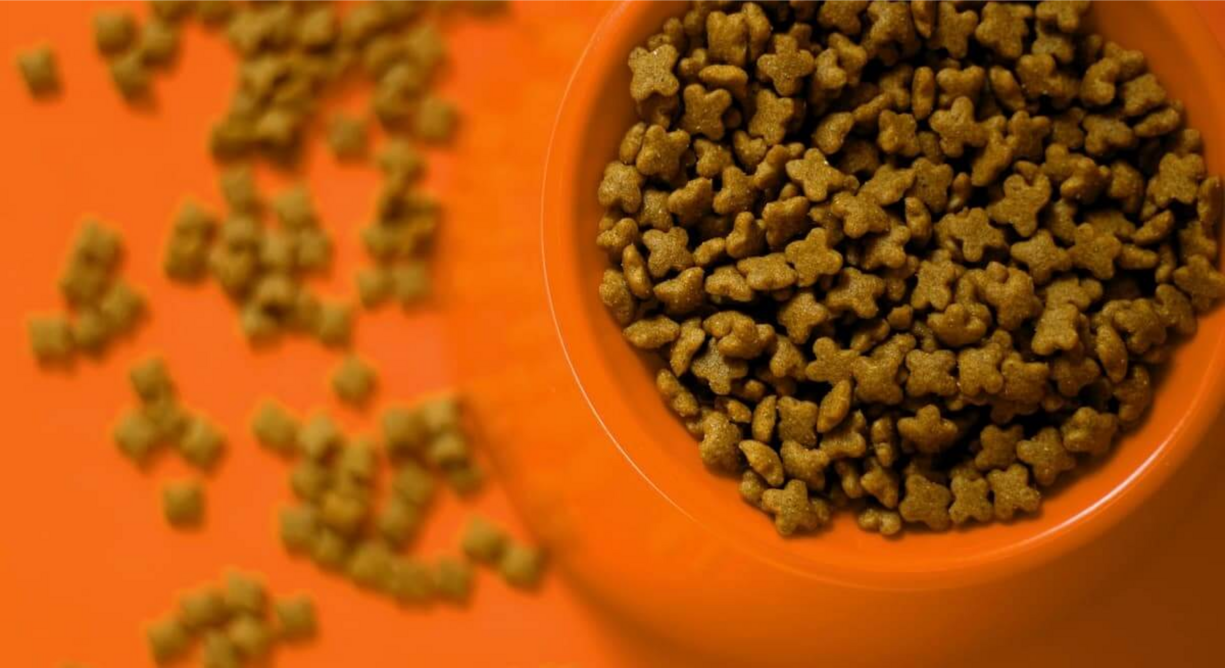
Why Is It Important To Transition?
Your puppy's nutritional needs won't change overnight; they aren't a puppy one day and an adult the next. Rather growth and metabolism will slow and change as they transition into adulthood. Their nutrient requirements will slowly adjust as their body settles into adulthood. Likewise, their diet should transition to match this.
A puppy's digestive system will also have adapted to the diet they've been eating, already prepared to digest what it expects is coming. Suddenly introducing a new food could throw off that digestive system balance, leading to digestive upset.
How Do I Transition To An Adult Food?
The general transition guide is to increase the amount of new food in the meal by 25% every 2-3 days. For many dogs, this will look like:
Day 1-2: 25% Adult Food with 75% Puppy Food
Day 3-4: 50% Adult Food with 50% Puppy Food
Day 5-6: 75% Adult Food with 25% Puppy Food
Day 7 Onwards: 100% Adult Food
For more detailed information on the diet transition process, check out our article How to Introduce a New Food to Your Pet.
What Do I Need To Monitor For During The Transition?
Not all dogs will handle a diet transition the same way, some may have a sensitive stomach or be fussy about flavours. During the transition, monitor your dog for any vomiting, diarrhoea, food refusal, tummy gurgles, constipation, excessive drooling, or bad breath.
Dogs with a known sensitive stomach will generally need to be transitioned more slowly. If your puppy reacts to their new adult food, then you may need to prolong the transition period to allow them to adapt to it.
If your puppy has any symptoms that persist for longer than 24 hours and cannot be resolved by stopping the new food or a bland diet, then it is recommended to take them in to your regular veterinarian for examination.
Not sure if your puppy needs to see the vet? Reach out to our Vet Squad via Live Chat for prompt general advice.
How Often Should I Feed My Puppy vs Adult Dog?
How often your puppy gets fed will depend on their age. By the time that your puppy comes to live with you in their furever home at 6-8 weeks of age, they will need to be fed 3-4 times a day. After 16 weeks or 4 months of age, your pup will only need to be fed 3 times a day until they are 6 months of age. Between 6-12 months of age, you can transition your puppy onto twice daily feeding.
Once your dog is on their adult diet, you can opt to feed them once or twice a day depending on your personal preference or your individual dog's needs.
Even though your puppy's number of daily feedings is decreasing, they will still need to eat enough to meet their energy requirements for growth. Not sure how much food your puppy should be eating? Why not check out our Pet Feeding Guide for detailed instructions on how to calculate your puppy's daily energy requirements.
Transitioning To Adult Food
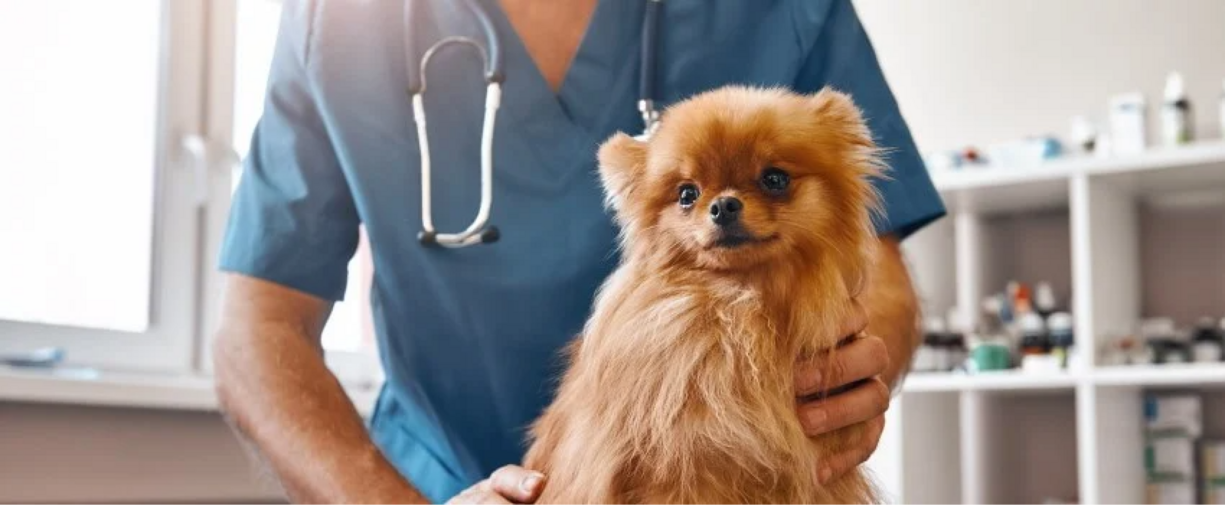
You may have noticed above that the transition ages are ranges. This is because not all dogs within the breed size classification will mature at the same rate and some breeds may fall between categories, such as the French Bulldog or American Staffy. So how do you know exactly when to transition your pup?
This is where your vet plays a key role. Your veterinarian will use a combination of your dog's breed, age, growth rate and Body Condition Score to determine what age is the best for them to transition onto an adult diet. This is particularly helpful for mixed breed dogs that may have an uncertain adult weight, but is also important for purebreds as there can be significant growth variations even within a breed.
Some puppies may also be prone to conditions like Hip Dysplasia or be diagnosed with a joint condition during their puppyhood that prompt your vet to recommend feeding a puppy food for longer. Alternatively, a puppy that has reached 80% of its adult size and seems to be rapidly gaining excess weight, may be encouraged to transition sooner. There are also some health conditions that may warrant feeding a specific type of food.
If you are ever in doubt about whether your puppy should be transitioning onto an adult diet or not, check with your vet.
Benefits Of Choosing A Premium Adult Food
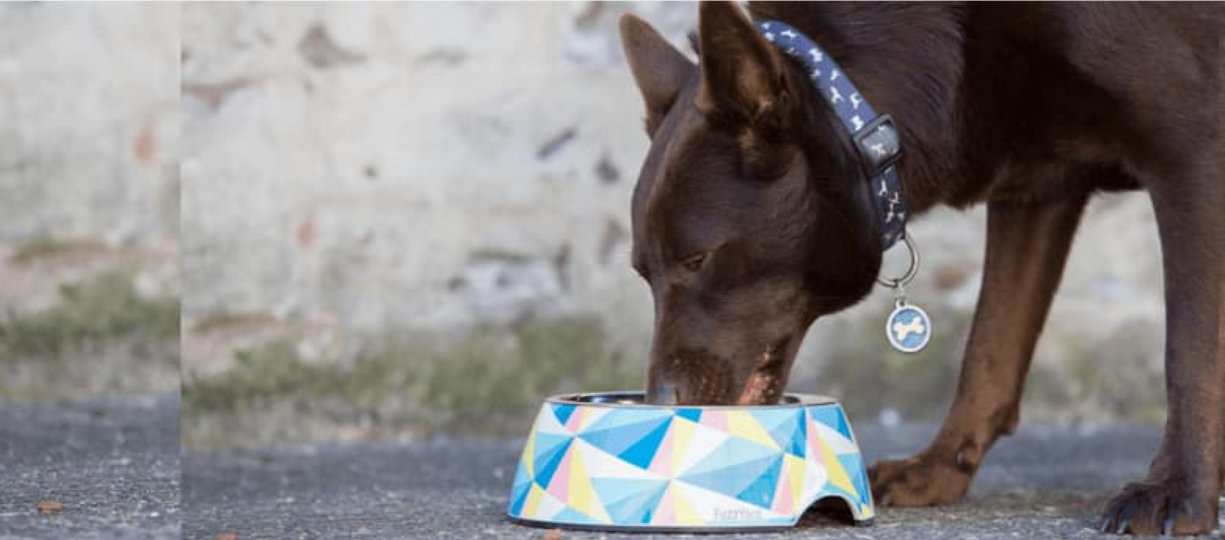
AAFCO (which stands for Association of American Feed Control Officials) lays out guidelines for the minimal nutritional requirements for puppy, adult and senior diets, especially in regards to protein, fat, carbohydrate, vitamin and mineral levels. It is essential that your dog is eating a diet that meets these minimum standards. However, we recommend feeding your dog a premium diet.
Premium diets go above and beyond the AAFCO minimum guidelines to provide a diet tailored to your dog's nutritional needs and to nourish not just feed. They use high quality, easily digestible ingredients to avoid digestive upsets and produce less waste (which means less poop for you to pick up!).
They also include therapeutic ingredients to support overall health including skin and coat, brain development, immune function, healthy digestion, heart health, dental care and, in many large breed diets, joint health. These added ingredients help to set your dog up for a long, healthy life and keep them looking and feeling their best.
Premium diets also benefit owners with reduced faecal output and odour, less digestive upset and often they are more cost effective in the long run. Premium diets also tend to offer options for all life stages, making it easier for you to transition from puppy to adult and senior food, and stick with the same brand life long.
Some brands, like Royal Canin and Advance also produce breed specific diets, which tailor their nutritional values to the specific needs of their targeted breed and have a kibble shape designed specifically to suit the breed. Some examples of breeds with their own diet are Oodles, French Bulldogs, Golden Retrievers and Dachshunds.
Not sure which puppy food is the best for your puppy? Our top recommended puppy food diets are listed in our article What is the Best Puppy Food?.
Top Recommended Puppy Foods:
Transitioning your puppy to an adult food at the right time can set them up for a long, healthy life and prevent a variety of health conditions like obesity, developmental joint diseases, tummy upsets and general illness. Using age and breed recommendations is a great starting point to help decide when is the right time. Your vet can always help with choosing the right time for your pup and ensuring optimal life long health.
Further Reading
Want to know more? Check out our Discover Page for more tips from our expert vets on keeping your pets happy and healthy.